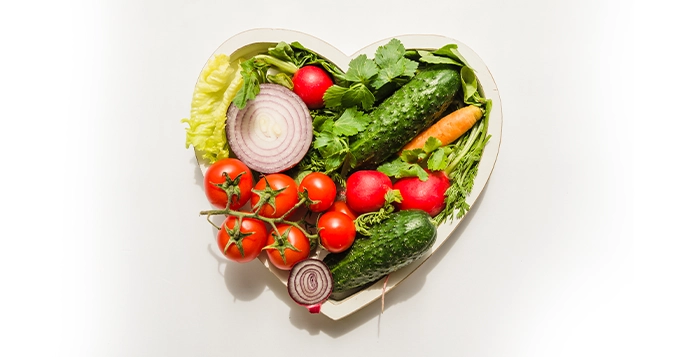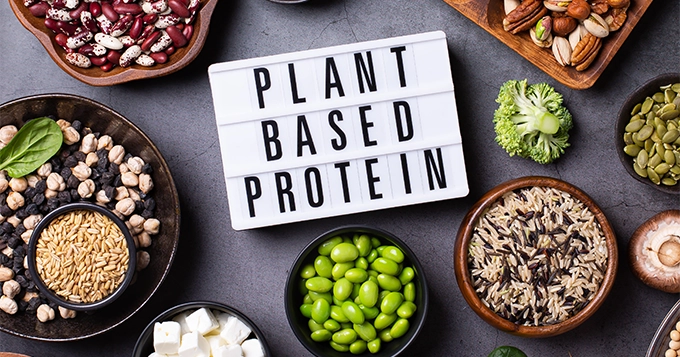The rise in popularity of veganism is not just a temporary trend; it’s a deliberate and moral decision that goes beyond dietary preferences.
Being vegan means avoiding all animal-derived products and focusing on a diet rich in plant-based foods. This article explores the unique aspects and numerous advantages of adopting a vegan lifestyle, highlighting its effects on one’s health, the environment, and moral considerations.
Distinctive Features of a Vegan Diet
Plant-Based Foundation
At the core of a vegan diet is the reliance on plant-based foods, including fruits, veggies, grains, legumes, nuts, and seeds. This shift away from animal products contributes to a diet rich in fiber, vitamins, and phytonutrients.
Exclusion of Animal Products
Unlike vegetarianism, which may include dairy and eggs, a vegan diet excludes all animal products. This means no meat, poultry, fish, dairy, eggs, or any other products derived from animals.
Diverse Protein Sources
Contrary to the misconception that plant-based diets lack protein, vegans source their protein from a variety of plant-based options, including legumes, tofu, tempeh, quinoa, and nuts.
Emphasis on Whole Foods
Veganism often encourages the consumption of whole, minimally processed foods. This emphasis on natural and unprocessed options can lead to a diet that is nutrient-dense and supports overall well-being.
Innovation in Plant-Based Alternatives
As the popularity of veganism grows, there’s a continuous surge in the development of innovative plant-based alternatives. These food alternatives mimic the taste and texture of traditional animal products, offering a wide range of options for vegans.
Veganism Beyond the Plate
Veganism goes beyond just what people eat; it’s a comprehensive lifestyle that has far-reaching effects. While eating plant-based foods is a crucial part of being vegan, the essence of veganism also includes a deep commitment to kindness, moral values, and environmental responsibility.
Fashion
In addition to avoiding animal products in their diet, vegans also choose to avoid using any materials, fabrics, or ingredients derived from animals in their clothing and other purchases. This means they opt for clothing and items made without the use of any animal products.
Cosmetics
Cosmetics that are considered vegan refer to beauty products that do not use animal-derived ingredients, such as gelatin, cholesterol, or collagen, as well as animal by-products like honey, beeswax, or milk. Many people believe that veganism also means that the products don’t use animals for their tests.
Environmental Consciousness
Veganism is a powerful expression of environmental awareness. Animal agriculture contributes to greenhouse gas emissions, deforestation, and water pollution. Vegans actively reduce their environmental footprint by choosing plant-based alternatives and contributing to a more sustainable planet.
Benefits of Vegan Diet
1. Improved Heart Health
One of the benefits of veganism is improving heart health. A well-planned vegan diet is linked to lower blood pressure, lower bad cholesterol levels, and a reduced risk of heart disease. The absence of saturated fats from animal products contributes to cardiovascular health.
2. Weight Management
Studies suggest that individuals following a vegan diet tend to have average lower body mass indexes (BMIs). The focus on plant-based, nutrient-dense foods can support weight management and a healthy body composition.
3. Enhanced Digestive Health
The abundance of fiber in a vegan diet promotes digestive health by preventing constipation. It also supports a diverse gut microbiome. This fiber-rich diet may reduce the risk of certain digestive disorders.
4. Reduced Environmental Impact
Adopting a vegan lifestyle is often motivated by environmental concerns. The production processes of plant-based foods typically have a lower environmental footprint, including reduced greenhouse gas emissions, land use, and water consumption compared to animal agriculture.
5. Ethical Considerations
Many individuals choose a vegan lifestyle due to ethical reasons, rejecting the exploitation of animals for food. The commitment to cruelty-free living aligns with the principles of compassion and sustainability.
6. Lower Risk of Certain Types of Cancer
Some research findings suggest that one of the vegan benefits may be associated with a lower risk of certain cancers, such as colorectal and breast cancer. Additionally, it may contribute to a reduced risk of type 2 diabetes.
Vegan Protein Sources
Adopting a plant-based diet rich in fruits, vegetables, and legumes is a key aspect of vegan nutrition, providing essential nutrients while aligning with ethical and environmental values. One frequent concern about vegetarian and vegan eating habits is that they might need to provide more protein.
Here are 10 plant-based sources of protein:
- Legumes such as lentils provide an excellent source of plant-based protein, offering approximately 9 grams of protein per half-cup serving.
- Chickpeas, another legume, contribute to plant-based protein intake with around 7 grams per half-cup serving.
- Quinoa, a versatile grain, is rich in protein, providing approximately 8 grams per cup.
- Tofu, a soy-based product, is a protein powerhouse, supplying roughly 20 grams per cup.
- Nuts, such as almonds, are nutritious plant-based protein sources, offering about 6 grams per ounce.
- Seeds like chia seeds contribute to protein intake, providing approximately 5 grams per two tablespoons.
- Black beans, a beloved legume, provide a substantial source of plant-based protein, offering around 8 grams per half-cup serving.
- Edamame, young soybeans, are a tasty and protein-rich option, providing about 17 grams per cup.
- Hemp seeds, often considered a superfood, pack a punch with around ten grams of protein per three tablespoons.
- Green peas, a versatile vegetable, add to the plant-based protein spectrum with approximately 8 grams per cup.









